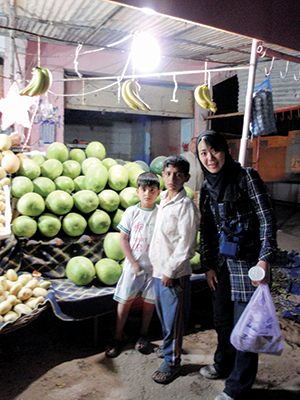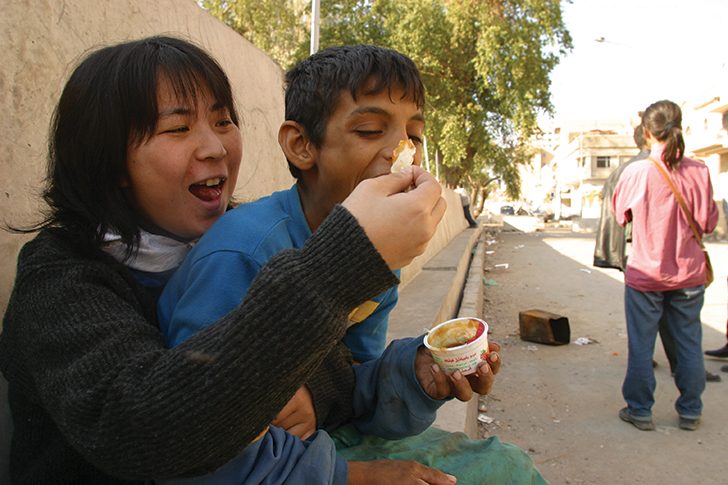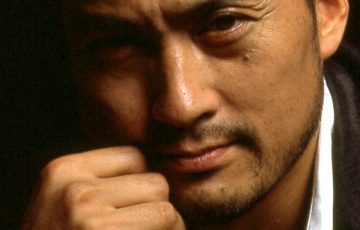 For years, the images of Nahoko Takato haunted me. In the early weeks of April 2004, not one day went by in Japan without seeing her robed in black, blindfolded and physically threatened at knifepoint by the Iraqi radicals Saraya-Al-Mujahedeen. On April 7, three young Japanese were kidnapped in Fallujah. The terrorists demanded that the 550-strong Japan Self-Defense Force leave Iraq within three days or the three would be “burned alive and fed to the fighters.” Nine days later, without any withdrawal, the young people were freed after intervention by the Islamic Clerics Committee, an influential local tribal group.
For years, the images of Nahoko Takato haunted me. In the early weeks of April 2004, not one day went by in Japan without seeing her robed in black, blindfolded and physically threatened at knifepoint by the Iraqi radicals Saraya-Al-Mujahedeen. On April 7, three young Japanese were kidnapped in Fallujah. The terrorists demanded that the 550-strong Japan Self-Defense Force leave Iraq within three days or the three would be “burned alive and fed to the fighters.” Nine days later, without any withdrawal, the young people were freed after intervention by the Islamic Clerics Committee, an influential local tribal group.
The last televised image of Takato was upon her return to Japan. Her complexion sallow, her eyes lifeless and head hung low. Five years later, I would meet Nahoko Takato in April 2009, shortly after her first return to Iraq since the kidnapping. In these years, Takato has transformed herself from being that lifeless victim to an international worker extraordinaire, raising over 31 million yen to help rebuild Iraq in forms of school construction and employment training programs. The ordeal of Nahoko Takato sheds light into a dark side of Japanese society. But her recovery is a tale of human resilience. It is perhaps her voice that is most surprising about the more mature 39 year-old Nahoko Takato, who speaks in a husky tone, now somewhat raspy from years of chain-smoking. Takato speaks rapidly and with an urgency of someone driven by a mission.
What she brought on her first trip back to Iraq reflects a true understanding what people there need: solar panels, medical equipment and stuffed animals. “In many Iraqi cities, electricity is still a fickle luxury. Electrical wires connected by individuals spiral around poles in complex and dangerous webs. She brought solar panels to be used for a primary school. For children needing comfort, Takato brought stuffed animals.
Since 2004, Takato had been to Jordan to help build a school in Fallujah, but did not enter Iraq until this April. Cities like Fallujah and Ramadi in the province of Anbar, located in the middle of the Sunni triangle, were hotbeds for Al Qaeda activity and heavily bombed. Caught between the foreign fighters and the American military, the local community was devastated. Through the Internet, she had kept vigilant tabs on the developments in Anbar, and earlier this year, she finally felt Ramadi was safe.
In photos she took on her April trip, much of them focused on how life is normalized there. She speaks excitedly about a popular restaurant that was bombed during the conflict and now rebuilt, larger and more ornate. She talks about the determination of the Iraqi people that went from experiencing daily violence to prosperity in such a short time. Stores now open late into the night. “Even at 10 pm, children can now walk the streets to buy fruit,” she says.
How important for her was going back to Iraq? “For the last five years, the kidnapping incident was in the present tense for me. I felt paralyzed emotionally. In this state, I could not have strong feelings like falling in love. But with this trip, I finally feel I can put the kidnapping behind me,” she says. “Recovery was not instantaneous.
Even surrounded by women and children in daylight, I would suddenly have a flashback because the kidnapping began in an innocent setting as well. But day by day, being welcomed by friends, I was eventually ready to meet new people. Towards the end, I felt I had closed the Iraq chapter of my 2004 trauma.”
However, there was another portion to the trauma Takato experienced that remained unresolved – the bashing she received from the Japanese public because she was kidnapped. Psychiatrist Dr. Satoru Saito who examined Takato after her return to Japan had commented that she is suffering from an acute case of Post-Traumatic Stress Disorder (PTSD) and the stress she felt seeing the reaction back in Japan was more traumatizing than being held at knifepoint.
Criticisms of Takato and her two companions began as soon as news of their kidnapping reached Japan. Initially, the criticism was from right-wingers who circulated rumors that she was in fact part of the Red Army and the kidnapping was a hoax to put pressure on the Koizumi administration to withdraw the troops. She was painted as a traitor. Images of her embracing the Islamic clerics responsible for her release provoked some to denounce her. “If you love Iraq so much, please do Japan a favor and defect to that country!” were examples of Internet comments.
But the criticism of Takato and photojournalist Soichiro Koriyama and freelance writer Noriaki Imai, were not limited to right-wing radicals. Many, over 30 percent according to one television station poll, expressed that the three should not have been in Iraq because they failed to heed government warnings to evacuate.
The fact that their repatriation was publicly funded outraged many who felt they should bear “personal responsibility” for their flight. (What some people do not realize is that in the many unpublicized cases when the repatriation of Japanese nationals abroad is deemed necessary – even for personal reasons such as psychiatric care – the government foots the bill.) Although their families readily paid the cost of their return, resentment still raged on as politicians pointed out that much more in terms of finances and human resources were spent negotiating for their release.
The contempt against the three kidnapped had reached a hysterical level. Even before their return, their homes had to be guarded by police forces to keep their families safe from angry hecklers. The windshield of someone who organized a lecture she gave was broken from pelting rocks. For months, tranquilized, she wallowed in self-hate, blaming herself for being kidnapped. “I cried and I cried. I did not remember where in my home I fell asleep,” she said.
Citizens of other countries such as Korea and Italy were also kidnapped, yet when their hostages were released, nations rejoiced at the return. The harsh criticism heaped upon the kidnapped victims caused the world to question Japan’s morality. Both the New York Times and France’s Le Monde newspapers wrote editorials condemning Japan for treating the hostages so critically. Then the U.S. secretary of state Colin Powell even commented on a Japanese televised interview: “I’m pleased that these Japanese citizens were willing to put themselves at risk for a greater good, for a better purpose. And the Japanese people should be very proud that they have citizens like this willing to do that.”
The influential writer Ryu Murakami has observed that Japanese society sometimes ostracizes victims. In writing about the victims of the Aum Shinri subway gas attacks, he pointed out that they were viewed not sympathetically, but suspiciously. Their mere existence is a reminder of the pain people would rather forget.
Takato echoes her own bewilderment about how adverse Japanese people are to helping those in greater need. “When I made Braille books for the blind, people mocked me,” she recalls. At 30, she was managing a karaoke bar but wanted to do something that “mattered” and went abroad as a volunteer. She ventured to first join Mother’s Theresa’s Missionaries of Charity in India, then went to do hospice work in Thailand and Cambodia.
In 2003, she visited Iraq and soon began organizing the provision of medical supplies to hospitals as well as working to get youths off the streets of Baghdad.
It is in foreign countries that Takato realized that her desire to help people less fortunate was met with appreciation, not mockery. She began to be able to express her feelings. “I was tired of having to always control my feelings in Japan. But when you see people dying everyday, there is no need to hold back emotions whether it is joy, grief or anger.”
However in 2004, Takato found herself shutting down emotionally for years. “I made peace with the people of Iraq since my trip in April. Now I realize I have to confront my feelings towards Japanese people.”
Takato has since stated that she never expected the SDF to be withdrawn because of her. “Prime Minister Koizumi made the right decision. I don’t think it would have been right to give into the demands of the terrorists.” She also takes personal responsibility for her safety and is prepared to perish in Iraq if it came down to it.
As for the general public who expressed anger towards her, from the thousands of lectures she has given on the status of Iraq throughout these years, slowly she has come to understand them. “Most people who were angry at me did not know the real circumstances.
For example, they thought we had chartered a jumbo jet with taxpayer money, which was not the case. When they heard me speak, many apologized for their lack of understanding.” To this day, thousands of Japanese have contributed to her activities to rebuild Iraq–over ¥30 million in funds to support Takato’s overseas aid.
For years, Takato had been the most visible sufferer of PTSD as well as the face of “victim-blaming” in Japan. The road to recovery has not always been easy, but just like the people of Anbar she champions who are slowly rebuilding their society, Takato is proof that where ever there is hope, there is healing.
Story by Carol Hui
From J SELECT Magazine, November 2009















Recent Comments